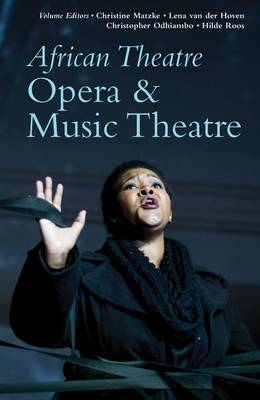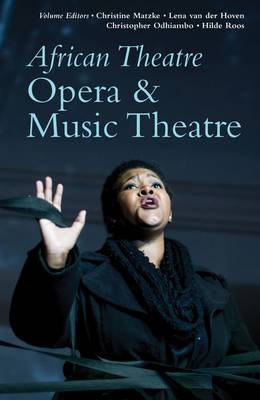
- Retrait gratuit dans votre magasin Club
- 7.000.000 titres dans notre catalogue
- Payer en toute sécurité
- Toujours un magasin près de chez vous
- Retrait gratuit dans votre magasin Club
- 7.000.0000 titres dans notre catalogue
- Payer en toute sécurité
- Toujours un magasin près de chez vous
177,45 €
+ 354 points
Description
Compelling inside views of what characterises opera and music theatre in African and African diasporic contexts. Music is often cited as a central artistic mode in African theatre and performance practices. However, little attention has been paid to music theatre on the continent in general, and to opera in particular, with the exceptions ofa few noted genres, such as Concert Party or the Yorùbá "folk opera" of the 1960s, and the emerging research on opera culture in South Africa.
This volume of African Theatre highlights the diversity across the continent from a variety of perspectives - including those of genre, media, and historiography. Above all, it raises questions and encourages debate: What does "opera" mean in African and African diasporic contexts? What are its practices and legacies - colonial, postcolonial and decolonial; what is its relation to the intersectionalities of race and class? How do opera and music theatre reflect, change or obscure social, political and economic realities? How are they connected to educational and cultural institutions, and non-profit organisations? And why is opera contradictorily, at various times, perceived as both "grand" and "elitist, "folk" and "quotidian", "Eurocentric" and "indigenous"?
Contributors also address aesthetic transformation processes, the porousness of genre boundaries and the role of space and place, with examples ranging from Egypt to South Africa, from Uganda to West Africa and the USA.
The playscript in this volume is We Take Care of Our Own by Zainabu Jallo
GUEST EDITORS: Christine Matzke, Lena van der Hoven, Christopher Odhiambo & Hilde Roos Series Editors: Yvette Hutchison, Reader, Department of Theatre & Performance Studies, University of Warwick; Chukwuma Okoye, Reader in African Theatre & Performance University of Ibadan; Jane Plastow, Professor of African Theatre, University of Leeds.
This volume of African Theatre highlights the diversity across the continent from a variety of perspectives - including those of genre, media, and historiography. Above all, it raises questions and encourages debate: What does "opera" mean in African and African diasporic contexts? What are its practices and legacies - colonial, postcolonial and decolonial; what is its relation to the intersectionalities of race and class? How do opera and music theatre reflect, change or obscure social, political and economic realities? How are they connected to educational and cultural institutions, and non-profit organisations? And why is opera contradictorily, at various times, perceived as both "grand" and "elitist, "folk" and "quotidian", "Eurocentric" and "indigenous"?
Contributors also address aesthetic transformation processes, the porousness of genre boundaries and the role of space and place, with examples ranging from Egypt to South Africa, from Uganda to West Africa and the USA.
The playscript in this volume is We Take Care of Our Own by Zainabu Jallo
GUEST EDITORS: Christine Matzke, Lena van der Hoven, Christopher Odhiambo & Hilde Roos Series Editors: Yvette Hutchison, Reader, Department of Theatre & Performance Studies, University of Warwick; Chukwuma Okoye, Reader in African Theatre & Performance University of Ibadan; Jane Plastow, Professor of African Theatre, University of Leeds.
Spécifications
Parties prenantes
- Editeur:
Contenu
- Nombre de pages :
- 288
- Langue:
- Anglais
- Collection :
- Tome:
- n° 19
Caractéristiques
- EAN:
- 9781847012579
- Date de parution :
- 20-11-20
- Format:
- Livre relié
- Format numérique:
- Genaaid
- Dimensions :
- 140 mm x 216 mm
- Poids :
- 480 g

Les avis
Nous publions uniquement les avis qui respectent les conditions requises. Consultez nos conditions pour les avis.





